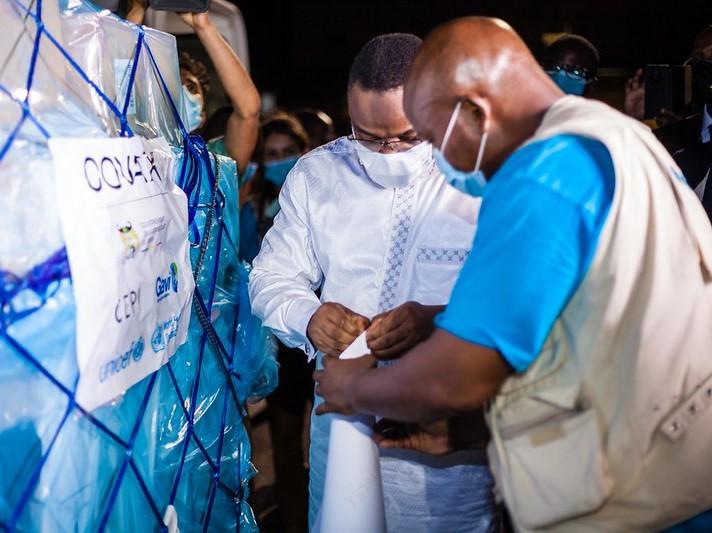A complex picture of increased vaccine demand in the face of increased activity from SARS-CoV-2 variants is prompting global health groups to search for ways to keep production flowing and add more doses.
Meanwhile, regulatory groups are looking into rare reports of bleeding problems in people who receive the AstraZeneca-Oxford vaccine and whether blood clots might also be linked to the Johnson & Johnson vaccine. And surges rose to new record levels in a number of hotspot countries, including Argentina, Brazil, India, and Turkey.
Low-income nations get fraction of supply
At a World Health Organization (WHO) briefing today, Director-General Tedros Adhanom Ghebreyesus, PhD, said more than 700 million vaccine doses have been given across the world, but more than 87% have targeted high- and middle-income countries, with low-income countries receiving just 0.2%.
He said WHO and its partners—Gavi, the Vaccine Alliance, and the Coalition for Epidemic Preparedness Innovations—are working on several options for speeding production and supply.
WHO officials repeated today that vaccines aren't the only answer to knocking down surges and that countries are already equipped with public health measures, such as wearing masks and limiting gatherings, for cutting the spread of the virus.
Seth Berkley, MD, Gavi's chief executive officer, said, however, the hope is that vaccines will change the dynamics of virus spread.
He said experts are starting to see supply constraints, not only because countries such as India have cut back on exports to manage crisis situations in their own nations, but also because demand and ramped up production threaten the supply of vaccines themselves, as well as the raw materials that all producers need to make vaccines.
Berkley said officials are discussing ways to optimize vaccine materials for all producers and are looking ahead to 2022 when the world may need booster shots or vaccines that target particular variants, and that Gavi is spearing a push for an extra $2 billion to meet the different COVAX challenges.
He said global health groups anticipate that more companies from more nations will be part of the solution for rolling out more doses through COVAX, the program designed to ensure equitable vaccine distribution. Berkley also said talks are underway about new cost-sharing mechanisms that would allow lower-income countries to buy even more vaccine.
Rogerio Gaspar, PhD, the WHO's director of regulation and prequalification, said the WHO's advisory group is in the final stages of evaluating China's Sinovac and Sinopharm vaccines and it hopes to consider at least one of them at its meeting on Apr 26 and possibly the other when the group meets again on May 3.
Experts keep focus on rare side effects
The European Medicines Agency (EMA) said today that the group's safety committee has concluded that unusual blood clots with low platelets should be listed as a very rare side effect of the AstraZeneca vaccine.
It also said its safety committee has launched a review of reports of capillary leak syndrome in some people who have received the vaccine. So far, five cases of the very rare disorder have been reported from Europe's vaccine safety database.
Also, the EMA announced that the safety committee has started looking at reports of blood clots in people who received the Johnson & Johnson vaccine, based on four reports—one from a clinical trial and three following the vaccine's introduction in the United States. One of the cases was fatal.
Elsewhere, regulators in India are looking for any domestic blood clotting linked to the AstraZeneca vaccine, some of which is produced at the country's Serum Institute, according to Reuters, which cited Mint, a financial daily news outlet in India.
In related developments, some countries continue to refine their recommendations, based on the ongoing investigations. French health officials said today that those younger than 55 who got AstraZeneca as their first dose should receive an mRNA vaccine as their second dose. At today's WHO briefing, when asked about dose mixing, Gaspar said there are no data on the benefits or drawbacks of dose mixing.
Yesterday, United Kingdom vaccine advisors urged people younger than 30 to receive a vaccine other than AstraZeneca when available.
More global developments
- Of countries reporting new records, Turkey yesterday reported a single-day high for cases, as did Argentina and India. And Brazil reported a record daily high for deaths, with 4,249 more reported, as the country's Senate ordered an investigation into President Jair Bolsonaro's handling of the pandemic.
- Cases are rising in some Asian nations, including Thailand, South Korea, and Japan. South Korea tightened its measures, including closing nightclubs and other entertainment venues, while the Japanese government put Tokyo under a modified "quasi emergency" for a month to curb the city's spread.
- Germany's top public health officials said the country needs a 2- to 4-week lockdown to curb its spread and French officials said they expect cases to peak around Apr 20.
- The global total today topped 134 million, rising to 134,321,953 cases with 2,907,968 deaths, according to the Johns Hopkins online dashboard.




















